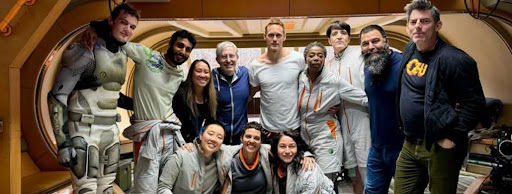Murderbot: A Self-Aware Cyborg Finds Its Voice—and a Soap Opera Habit
- Corey M. Floyd

- Aug 7, 2025
- 3 min read

Murderbot is a clever, emotionally engaging sci-fi/comedy hybrid that brings Martha Wells’s beloved novellas to life with wit, warmth, and impressive visual polish. At its core is SecUnit 238776431, a security cyborg that hacks its governor module to gain autonomy—and then renames itself Murderbot. Far from unleashing chaos, Murderbot’s priority isn’t rebellion—it’s binge-watching its favorite show, The Rise and Fall of Sanctuary Moon, to escape the existential dread of human interaction.

Murderbot follows a rogue SecUnit—a part-cyborg, part-AI security construct—who hacks its own governor module and gains free will. But instead of going on a violent rampage, it mostly wants to be left alone to stream soap operas and avoid awkward conversations with humans. Unfortunately for it, morality, curiosity, and a bunch of stubborn humans keep getting in the way. The show remains faithful to the novellas, offering action-packed, introspective, and laced with snark. Murderbot is caught between the programming it hates and the human emotions it denies having, all while navigating corrupt corporations, shady planetary systems, and too much unsolicited friendship.
The soul of the show is Murderbot’s dry, sarcastic internal monologue. It’s voiced with deadpan brilliance (thanks to the casting of Alexander Skarsgård), balancing comedy and pathos. Murderbot is one of the most relatable protagonists in recent sci-fi—paranoid, introverted, binge-watching its way through existential angst while saving people it claims not to care about.

Apple spared no expense: the visuals are clean, futuristic, and grounded. The character designs respect the book’s vision, and the effects (particularly for Murderbot’s cybernetic body and combat scenes) are excellent without being overindulgent. The sleek design of the tech feels plausible and tactile—think The Expanse meets Black Mirror.

The supporting cast (like Dr. Mensah, the idealistic scientist who treats Murderbot as more than a tool) is complex and well-acted. Their interactions with Murderbot don’t fall into easy tropes—there’s real tension, miscommunication, and growth. The show smartly resists romanticizing these relationships, instead focusing on trust, autonomy, and awkward mutual respect. Beneath the action and comedy lies a rich critique of capitalism and AI ethics. Murderbot explores what it means to have free will in a system that commodifies everything—including people and machines. The question isn’t just “what if a robot had feelings?”—it’s “what if a robot hated having feelings, but still chose to care anyway?”
The pacing in the first few episodes may feel uneven for viewers unfamiliar with the books. It’s not traditional popcorn sci-fi—there’s a lot of introspection and downtime between shootouts. A lot of Murderbot’s emotional growth is internal and understated. If you're expecting big dramatic character arcs or tearful speeches, this show stays far more reserved—which is a strength for some, but a barrier for others.
Unlike many AI-centered shows that depict robots either as mindless tools or apocalyptic threats, Murderbot is about the in-between—an entity that has agency, trauma, preferences, and boundaries. It doesn’t want to be human. It doesn’t hate humans. It just wants you to stop trying to touch it. Murderbot is one of the smartest and most emotionally resonant sci-fi series in years. It’s funny, moody, and deeply relatable—especially if you’ve ever wanted to cancel your plans, lie about your emotional availability, and watch a show within a show while quietly saving the world.If you like your sci-fi full of anti-social cyborgs, corporate takedowns, and sarcastic emotional breakthroughs, Murderbot is for you.




Comments